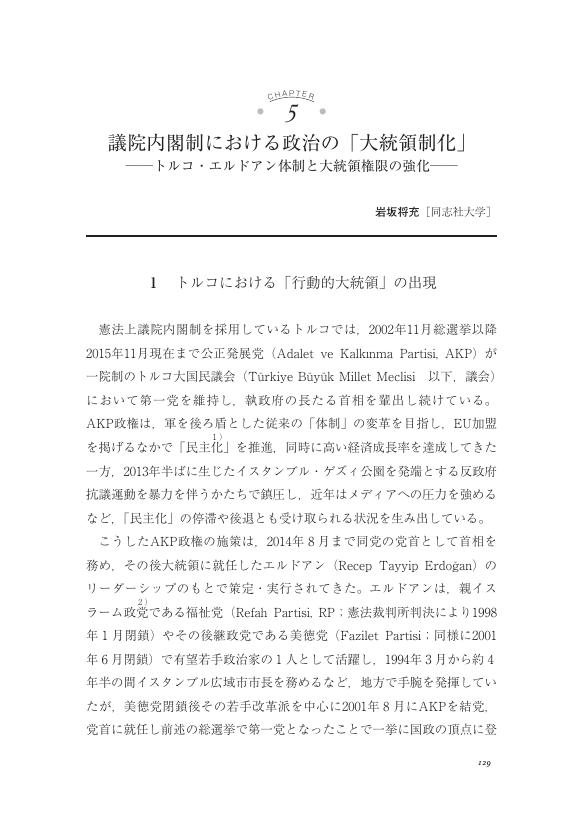14 0 0 0 OA トルコ・北キプロス関係の変化と東地中海地域の安全保障
- 著者
- 岩坂 将充
- 出版者
- 国際安全保障学会
- 雑誌
- 国際安全保障 (ISSN:13467573)
- 巻号頁・発行日
- vol.48, no.1, pp.43-59, 2020-06-30 (Released:2022-03-14)
2 0 0 0 OA CHAPTER 5 議院内閣制における政治の「大統領制化」
- 著者
- 岩坂 将充
- 出版者
- 日本比較政治学会
- 雑誌
- 日本比較政治学会年報 (ISSN:21852626)
- 巻号頁・発行日
- vol.18, pp.129-156, 2016 (Released:2020-03-16)
- 参考文献数
- 18
1 0 0 0 OA トルコにおける2015年総選挙とエルドアン体制の政策変容
- 著者
- 岩坂 将充
- 出版者
- 独立行政法人 日本貿易振興機構アジア経済研究所
- 雑誌
- 中東レビュー (ISSN:21884595)
- 巻号頁・発行日
- vol.3, pp.96-109, 2016 (Released:2019-12-03)
- 参考文献数
- 14
In Turkey, the political system in which Recep Tayyip Erdoğan plays the most important role – the “Erdoğan regime” – has been in place since November 2002. After Erdoğan’s party, the Justice and Development Party (Adalet ve Kalkınma Partisi, AKP), won the general elections and he became the prime minster, they were successful in maintaining the single-party administration over ten years. Even since becoming the president and devolving the premiership to Ahmet Davutoğlu in August 2014, Erdoğan has been at the center of the Turkish parliamentary system.However, in the Turkish general elections in June 2015, the AKP failed to get a majority of parliamentary seats for the first time, and the Erdoğan regime seemed to be faced with a crisis. The regime was able to regain the single-party administration in the early general elections in November 2015 by carrying out significant political change after their first electoral defeat. In this sense, for Turkey and the Erdoğan regime, the year 2015 was not only the year of the election, but also of political change.This paper analyzes these two general elections in 2015 and the changes of the political tendencies of the Erdoğan regime which have been observed since the general elections in June 2015 in particular. It also focuses on the changes in the strategies and the relationships among Turkish political actors including President Erdoğan, the AKP government, and the other major political parties.
1 0 0 0 OA トルコの選挙制度における阻止条項の機能低下 ―人民民主党をめぐる戦略と選挙連合
- 著者
- 岩坂 将充
- 出版者
- 日本政治学会
- 雑誌
- 年報政治学 (ISSN:05494192)
- 巻号頁・発行日
- vol.72, no.1, pp.1_62-1_80, 2021 (Released:2022-06-15)
- 参考文献数
- 32
本稿では、比例代表制を採用するトルコの選挙制度の特徴の1つであり、これまで政党政治に多大な影響を与えてきた全国得票率10%という高い閾値を持つ阻止条項が、近年その機能―小党乱立と国内少数民族であるクルド人に基盤を持つ政党 (クルド系政党) の議会進出の阻止―を低下させている点に注目し、その要因を明らかにすることを目的とする。本稿で指摘する要因は、クルド系政党やそれをめぐる有権者の戦略、そして2018年議会選挙から導入された選挙連合制度である。とりわけ人民民主党 (HDP) は、2015年6月議会選挙に際し、従来のクルド系政党とは異なりトルコのさまざまなマイノリティの権利擁護へと方針転換をしたことで支持の拡大に成功、さらには閾値を超え議席を獲得することで、長く政権を維持している公正発展党 (AKP) の勢力拡大を抑制できることを示した。選挙連合制度の導入とHDPの連合不参加の決断はこうした状況を加速させ、2018年議会選挙では明確なかたちで有権者の戦略投票、すなわちAKP抑制のためにHDPの閾値超えを意図した 「均衡のための閾値保険」 ともいえる投票をもたらした。本稿の事例は、とりわけ閾値とそれに影響を受ける政党獲得議席に焦点をあてた戦略投票が、選挙連合制度とともに阻止条項の機能低下を導いたとことを示すものである。
1 0 0 0 OA トルコにおける「民主化」の手法 ―文民化過程にみる「制度」と「思想」の相互作用―
- 著者
- 岩坂 将充
- 出版者
- 一般財団法人 日本国際政治学会
- 雑誌
- 国際政治 (ISSN:04542215)
- 巻号頁・発行日
- vol.2014, no.178, pp.178_132-178_145, 2014-11-10 (Released:2015-11-30)
- 参考文献数
- 40
Under the Justice and Development Party (Adalet ve Kalkınma Partisi), so-called “democratization”has been promoted on an unprecedented scale in Turkey. However, in a country where the military’s presence in politics has been very prominent, how far this democratization process has gone has not been fully investigated so far. In this article, I will seek to explain how democratization has been developed by analyzing the process of “civilianization”—which means the reducing of the military’s influence over politics—mainly under the JDP government. At the same time, by referring to the study by Ahmet T. Kuru, I will attempt to show that institution and ideology in civil-military relations have formed the background of democratization. The civilianization process in Turkey can be divided into three phases: (1) civilianization in institutions under the EU accession process; (2) the manifestation of civilianization in ideology; and (3) the civilianization of ideology through the judicial process. Before the JDP government emerged, the military developed institutions and an ideology to keep itself in power following the 1980 coup and the 1982 Constitution, which I call the “1982 regime” here. In the first phase, although the “1982 regime” had strongly consolidated itself, it could not resist the EU accession process that started at the end of 1999. The regime’s institutions were reformed to move the country toward EU membership because the regime’s ideology was open to joining the EU. In the second phase, such changes in institutions weakened the political influence of the military, and, in contrast, many civilian organizations that had been under the military’s influence strengthened their autonomy. For example, as observed in the “Republic Meeting” in April 2007, civic organizations that were considered to have the same ideology as the military acted autonomously. Moreover, the Constitutional Court dismissed the closure case for the JDP and judged, in its decision of July 2008, that the party’s reform had been effective for EU accession. In the last phase, the coup plan in 2003, which seemed to involve some retired military personnel, was judged in the courts, and it damaged the military’s prestige. In this understanding, it can be said that democratization, which has shown significant progress under the JDP government, has been realized by the military’s loss of its monopoly over ideology through the civilianization of the institutions of the “1982 regime” and the emphasis on EU values, such as freedom and liberal democracy, which had been neglected for a long time. Furthermore, it also can be said that ideology still has legitimacy in a different form and context from the “1982 regime.” Such changes in ideology and legitimacy will affect the further progress of democratization and the consolidation of democracy in Turkey.
1 0 0 0 OA 政軍関係研究の螺旋的発展に向けて
- 著者
- 岩坂 将充
- 出版者
- 一般財団法人 日本国際政治学会
- 雑誌
- 国際政治 (ISSN:04542215)
- 巻号頁・発行日
- vol.2018, no.190, pp.190_145-190_154, 2018-01-25 (Released:2018-12-19)
- 参考文献数
- 28


